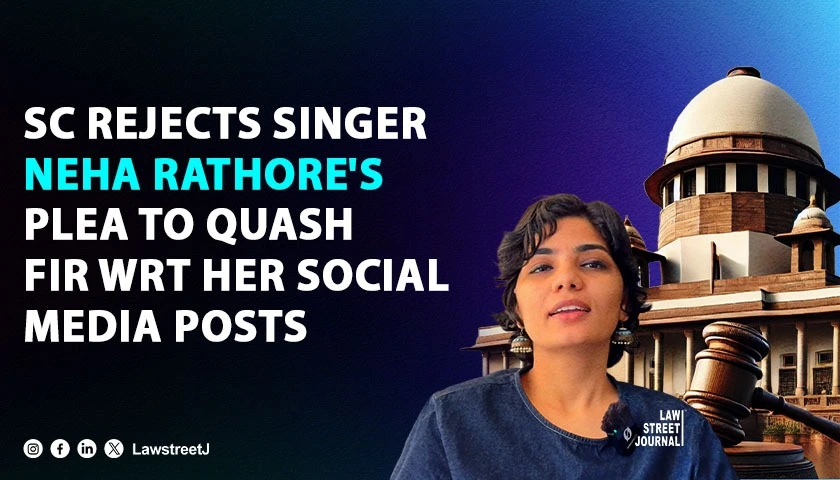New Delhi: The Supreme Court on Monday refused to entertain a plea by singer and activist Neha Singh Rathore challenging validity of an FIR lodged against her over a social media post on the Pahalgam terror attack.
A bench of Justices J K Maheshwari and Vijay Bishnoi, while refusing to grant any relief to Rathore, also made it clear that it was not expressing any opinion on the merits of the case.
"At this stage we are not interfering in the issue of the charge of mutiny (endangering the sovereignty, unity, and integrity of India)," the bench said.
The court granted her liberty to raise the issues at the time of framing of charges.
Her plea challenged the Allahabad High Court, declining her to quash the FIR.
Following her social media post on the Pahalgam terror attack, the FIR was lodged on April 27, 2025, at Hazratganj police station in Lucknow.
The FIR accused Rathore of offences under multiple provisions of the Bharatiya Nyaya Sanhita, 2023 including Sections 196, 197, 302, 152, and 353 as well as Section 69A of the Information Technology Act, 2008.
Also Watch
Senior advocate Kapil Sibal, appearing for Rathore, pleaded hat the charges of mutiny and other provisions under Sections 159, 196(1), and 197(1)(b)(c)(d) were wrongly invoked.
“How can I be tried for mutiny? I am only seeking quashing of certain sections while I face trial,” Sibal submitted.
The court was not impressed with the arguments of Sibal and eventually refused to grant her any relief.
"This court is not inclined to interfere with the FIR at this stage, effectively allowing the case to proceed. However, Singh was granted liberty to raise objections during framing of charges," the bench said.
Sibal said that there were serious apprehension that there might be a potential arrest of Rathore, but the court was unmoved and refused to stay any action under the FIR.
The Uttar Pradesh counsel opposed the arguments. He said that the timing and tenor of Rathore’s tweets made them far more serious than mere political dissent.
"The speech that undermines sovereignty, disrupts communal harmony or disrespects constitutional authorities cannot claim absolute protection. Similar petitions involving derogatory comments against leaders had earlier been dismissed," he said, asking the court to dismiss her plea.
Disclaimer: This content is produced and published by LawStreet Journal Media for informational purposes only and does not constitute legal advice. The views expressed are independent of any legal practice of the individuals involved.

















